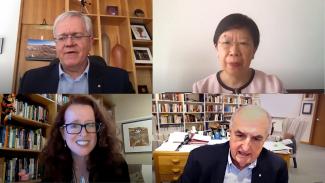
“SMU views the student as an individual who has personal learning needs, a social being who learns through interaction and collaboration, as well as a member of the larger community from which he or she draws benefits and to which he or she contributes back,” said SMU President Prof Lily Kong at the Future of Universities webinar presented by the Australian National University (ANU) on 4 June 2020.
“These three fundamental philosophical beliefs are what pivot the University to leverage technology to personalise learning, deepen interaction and collaboration, and enhance experiential learning for its students,” Prof Kong told the forum. She was making these comments as a panellist invited to share insights during a virtual dialogue held under the banner of the ANU Crawford Leadership Forum 2020.
Themed the Future of Universities within ANU’s ’Big Picture’ series, the session examined the profound and disruptive impact of Covid-19 on the education sector. Prof Kong’s fellow panellists included ANU Vice-Chancellor, Prof Brian P Schmidt, and President of Indiana University (IU), Prof Michael McRobbie. The interactive session included a total of fifty questions shortlisted ahead of the session, from close to 500 people who had signed up to watch a live streaming of the webinar.
Discussions during the hour-long session revolved around how universities had been adapting to disruptions caused by Covid-19 and whether these changes were here to stay for the long run. The topic chosen for the event was most timely, given that the pandemic has forced many universities around the world to shut their campuses and move classes online. This development has led some to believe that the mass adoption of online teaching and learning would supplant traditional, in-person tertiary education as we know it, and foretell the potentially irreversible changes to the modus operandi of institutes of higher learning.
“It’s entirely possible to put lots of material online [that] students can access in their own time, at their own pace,” commented Prof Kong. “But really what the students are looking for, and what they really learn from, is that interaction with somebody else on the other side of the screen.”
Concurring with Prof Kong’s point on the importance of synchronous interaction in online learning, Prof McRobbie shared that according to sociologists, “50 per cent of what students learn, they learn from interaction with other students and other aspects of their environment outside the classroom.”
“One thing we have learnt definitively is that students do not want to be locked in their parents’ basement for four years doing their degree online,” quipped Prof McRobbie. Even so, he acknowledged that the nature of on-campus experience would continue to evolve and become increasingly “more technology-mediated”, with universities moving towards a combination of “smaller classes, more interactive classes and flipped classes” in the future.
According to Prof Schmidt, the Covid-19 disruption had enabled reflections on what technology could enhance and also “made very clear where digital is a second cousin to the intense, in-person experience”. Observing that the pandemic had accelerated digitalisation, Prof Schmidt suggested that the “democratisation of learning” through online platforms meant more people would now have access to learning opportunities.
The flipside to this, as observed by Prof Kong, was that it also accentuated the digital divide between the haves and the have-nots, with cramped living spaces and slow Internet speeds being concerns for some students.
“In Singapore, the spread of Covid-19 infections among foreign workers living in cramped dormitories had sparked intense debates in the community on social inequality,” added Prof Kong. “This has prompted SMU to think about the kinds of research we should be doing as a university that contribute to a more equal and just society.”
Watch the video discussion at ANU TV on YouTube or listen to its audio recording at ANU Experience Soundcloud.